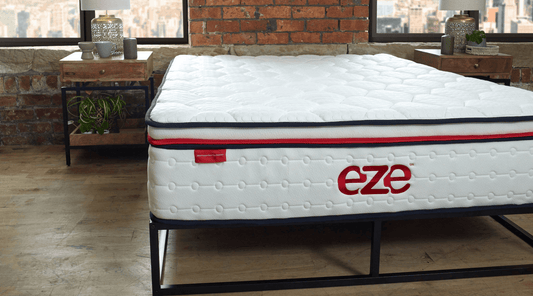It’s the big question that divides us as nation of dog lovers - should we allow our dogs to sleep in our beds or not?
There are those pup owners who absolutely adore their pets, but will not even let them up the stairs, let alone into their bedrooms. Then there are those who find it hard to sleep at night without their treasured pooch snuggled up by their side.
So, who is in the right? And, is there any evidence backing up either party? Here we investigate both the pros and cons of allowing your four-legged friends share your bed at night.
THE PROS

Comfort & Emotional Support
We get it, dogs are cute and cuddly and give us a lot of attention. But, can they really help to boost our mental health? Well, yes it seems they can, and there is a lot of research to back it up too. Studies looking into the release of the oxytocin hormone during human-animal contact have found that people with pets generally have a lower heart rate, lower blood pressure and a fewer loneliness symptoms. Even during stressful situations.
Therefore, for those who are struggling to sleep at night due to stress, anxiety or loneliness, co-sleeping with their pooch, could perhaps help to aid calm and relaxation, resulting in a better night’s sleep. In fact a 2018 study in the US found that women who shared their bed with a dog felt more comforted and safe that then did sleeping with another human.
Safety & Security
For people who live alone, or the elderly, night times can often be long and lonely. For some, they can also be spent in fear of break-ins, floods or fires.
Therefore, for this particular group, having their dog close by while they sleep may help them to feel more secure. They might feel safer knowing that their dog will pick up on any strange noises during the night and alert them, or pick up on alarms or signals if they are hard of hearing. In this instance, co-sleeping with a dog could prove invaluable in terms of safety and wellbeing.
THE CONS

Health & Cleanliness Issues
As lovely as dogs are, they also come with their own allergens and germs, which can aggravate human allergies and other medical conditions. Dog hair, fluff and fur can heighten the symptoms of asthma or other breathing conditions and therefore if you or any of your family suffer from these, your upstairs area should be a pet-free zone at all times.
If you do make the decision to let your pet in the bed, then cleanliness should be a big priority. Make sure to give your dog regular baths using a gentle shampoo as well as brushing to remove excess hair and fur before bed.
Mattress Issues
Even if you think your dog seems clean, remember their hygiene is never going to be as good as yours. Dog dirt, bacteria and drool will accumulate on your dog’s body and paws and will therefore be transferred onto your mattress and bed linen, causing lasting damage.
From a mattress hygiene point of view, we would always advise against sleeping with your pet. However, it’s your decision of course! If you are a dog co-sleeper, then it’s best to change your bed linen more regularly in a high wash, as well as vacuuming the mattress and then leaving it for a few hours to air with the windows open.
Relationship & Behavioural Issues
When it comes to relationships, bed sharing can often cause issues – both of the human and the dog kind.
Puppies, for example, should learn how to sleep alone so they don't grow up clingy and co-dependent on you. Similarly, if your dog is nervous or suffers from separation anxiety, he should not be in your bed either. A dog who suffers stress when you are away needs to practice feeling secure when not in your direct presence, such as at night.
It’s not just the dog’s emotions that could suffer either. Having a dog in your bed, could cause issues with your partner and negatively affect your love life. It’s therefore advisable for you and your partner to agree a routine that you are both happy with. You both have to feel comfortable with the arrangements to make it work for everybody involved!
The Final Opinion

Having considered all the pros and cons, it seems that both points of view could stand up equally in an argument here. Therefore, it seems that it really does depend on the dog, the human and their individual circumstances. Just like us humans, dogs come in all shapes, sizes and temperaments, therefore it’s quite impossible to make a general decision when it comes to this topic.
If you do make the decision to allow your dog to sleep in your bed, then be sure to set some strict ground-rules so that everyone is happy and knows their place. These could include;
- Only allowing him/her to jump onto your bed having been granted permission by you.
- Allowing him/her to only sleep in a certain spot on your bed – perhaps towards the bottom of the bed close to your feet.
- Making sure he/she is completely clean and washed before being allowed on the sheets.









